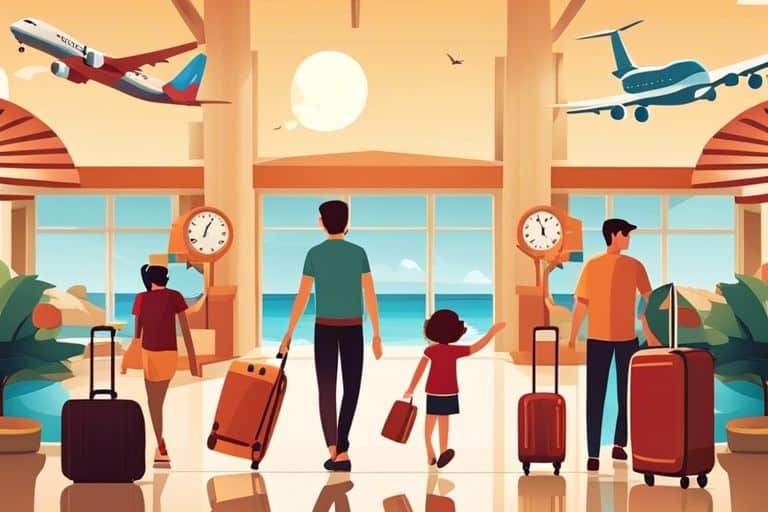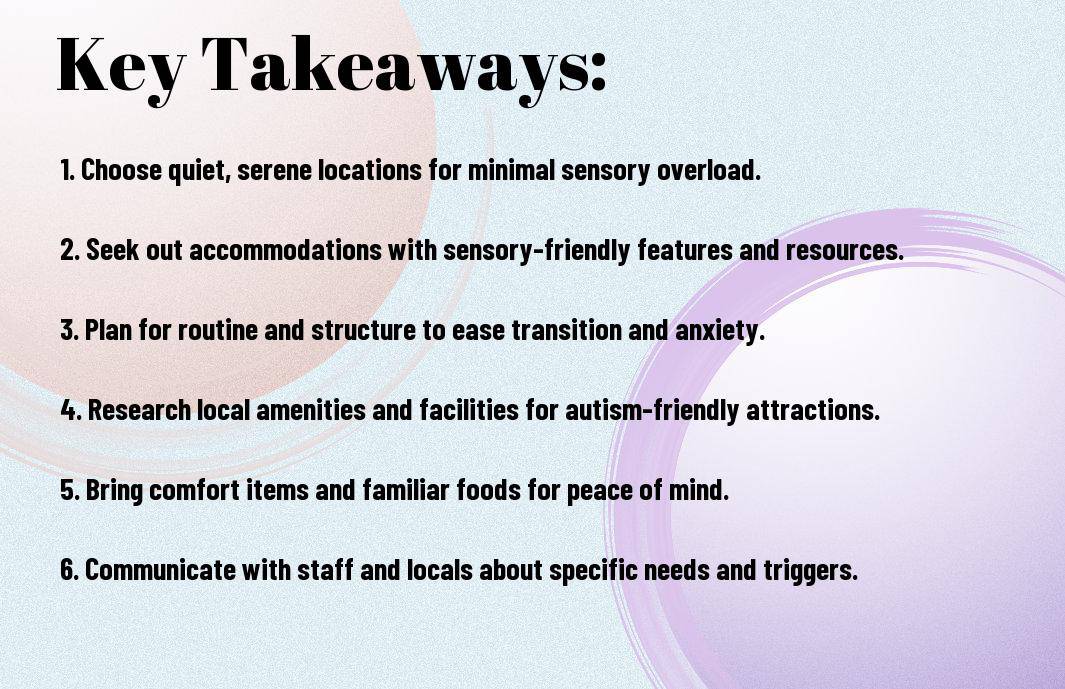Ubiquitously, families with individuals on the autism spectrum often face challenges when it comes to planning vacations. However, with Autism Travel, there are several autism-friendly vacation destinations and tips for travelling that can help make the experience smoother and more enjoyable. It is important to consider quiet and calm environments when choosing a vacation spot, and to plan ahead for sensory-friendly activities and accommodations. Additionally, understanding airport procedures and regulations can make the travel process less stressful for individuals with autism and their families. By being well-prepared and choosing the right destinations, families can ensure a positive and memorable vacation experience for everyone involved.
Key Takeaways:
- Research autism-friendly vacation destinations and accommodations before planning your trip.
- Plan ahead and communicate specific needs to airlines, hotels, and attractions to ensure a smooth and enjoyable experience.
- Stay flexible and be prepared for unexpected changes, and have a support system in place for added peace of mind.


Top Autism-Friendly Vacation Destinations
When planning a vacation for individuals with autism, it’s essential to consider destinations that are accommodating and understanding of their specific needs. Here are some top autism-friendly vacation destinations that provide a welcoming and inclusive environment for individuals with autism and their families.
Domestic Destinations for Families
For families looking for autism-friendly vacation options within the UK, destinations such as the Lake District and Cornwall provide a range of activities and accommodations suitable for individuals with autism. The Lake District offers serene natural landscapes and outdoor activities, while Cornwall boasts beautiful beaches and family-friendly attractions. Both destinations have a variety of autism-friendly accommodation options and amenities for families to enjoy a comfortable and relaxing holiday.
International Spots with Autism Accessibility
For those seeking international travel options, destinations like Disneyland Paris and the Universal Orlando Resort cater to individuals with autism by providing sensory-friendly experiences and accessibility services. These theme parks offer designated quiet areas, sensory-friendly shows, and special assistance passes to ensure a positive and inclusive experience for individuals with autism and their families.
Additionally, cities like Barcelona and Tokyo have made efforts to improve autism accessibility by implementing autism-friendly initiatives in public spaces and attractions. From sensory-friendly museums to autism-friendly hotels, these international spots offer a range of options for families seeking an inclusive and autism-friendly vacation experience.

Preparing for the Trip
When planning a vacation with someone on the autism spectrum, it’s important to prepare and make necessary arrangements to ensure a smooth and comfortable trip. Taking the time to carefully plan and pack, as well as considering the challenges of airports and public transport, can make a significant difference in the overall travel experience.
Planning and Packing: A Checklist
Before embarking on your trip, it’s essential to create a detailed checklist of all the items you will need to bring. This should include any sensory items or comfort objects that are essential for the individual with autism, as well as any necessary medications. It’s also important to plan for any potential changes in routine that may occur during the trip, and to pack familiar items or tools to help manage these transitions. Taking the time to plan and pack carefully can help reduce anxiety and ensure a more enjoyable travel experience for everyone.
Dealing with Airports and Public Transport
Travelling through airports and using public transport can be overwhelming for individuals with autism, due to the sensory overload and unpredictability of these environments. It’s important to research and plan for the specific challenges that may arise, and to consider alternative transportation options if necessary. Utilising visual schedules and social stories can help prepare the individual for the journey, and requesting special assistance or accommodations from the airport or transport providers can make the process smoother and more manageable.
When navigating airports and public transport, it’s crucial to remain aware of potential sensory triggers and to have a plan in place for managing any difficult situations. Utilising noise-cancelling headphones, providing clear instructions, and seeking out quiet areas or designated sensory rooms can help create a more positive and comfortable experience for travellers with autism.
During the Vacation
Now that you have carefully chosen one of the Top Autism-Friendly Vacation Spots recommended by Healing Haven, it’s time to focus on making the most of your trip. During the vacation, it’s important to keep in mind the specific needs and preferences of individuals with autism. By being well-prepared and informed, you can ensure a positive and enjoyable experience for everyone.
Accommodations and Autism-Friendly Amenities
When selecting accommodations, look for places that offer autism-friendly amenities such as quiet spaces, sensory-friendly rooms, and staff trained in understanding and supporting individuals with autism. It’s essential to communicate your specific requirements in advance to ensure that the necessary arrangements are in place upon your arrival. By choosing accommodation with these essential features, you can create a safe and comfortable environment for individuals with autism, allowing them to relax and enjoy their holiday to the fullest.
Activities and Attractions: Ensuring a Positive Experience
Before embarking on any activities or sightseeing, research the autism-friendly options available in your chosen destination. Look for attractions and tours that offer priority access, quiet hours, or sensory-friendly experiences to cater to the needs of individuals with autism. Planning ahead and identifying autism-friendly activities will minimise stress and maximise enjoyment for the entire family.
It’s important to be flexible and allow for breaks in the itinerary if needed. Engage in activities that resonate with the interests and passions of the individual with autism, and be mindful of their comfort levels throughout the experience. By tailoring the activities to accommodate their unique preferences, you can ensure a positive and enriching vacation for everyone.
Tips for a Successful Journey
Travelling with a child with autism can present challenges, but with careful planning and consideration, it can also be an enriching and enjoyable experience. Here are some tips to ensure a successful journey:
- Research and book autism-friendly accommodations and activities in advance
- Communicate your child’s needs and preferences to airline staff and hotel personnel
- Prepare a travel kit with familiar items and calming tools
- Stick to a familiar routine as much as possible
Assume that unexpected challenges may arise, but with proper preparation, you can navigate them effectively and ensure a smooth journey.
Managing Unexpected Challenges
Travelling with a child with autism may come with unexpected challenges such as sensory overload, communication difficulties, or disruptions to routines. It’s important to remain calm and be prepared to address these challenges as they arise. Having a plan in place and familiar items on hand can help manage unexpected situations effectively.
Keeping Routines and Comforts While Away
It’s crucial to maintain familiar routines and comforts while away from home, as this can provide a sense of security and stability for the child. Bringing along familiar items, such as toys or blankets, and sticking to established routines as much as possible can help create a familiar environment in a new setting.
Travelling with a child with autism may require extra consideration and planning, but it can also be a rewarding experience that allows for new opportunities for growth and exploration.
Conclusion: Autism-Friendly Vacation Destinations and Tips for Traveling
Travelling with a loved one who has autism can be challenging, but with the right planning and preparation, it is very much possible to have a successful and enjoyable vacation. From choosing the right destination to ensuring that accommodation and activities are suitable for individuals with autism, there are several key considerations to keep in mind. It is important to be proactive in communicating your needs to transportation providers, hotel staff, and tour operators to ensure a smooth and stress-free experience. Additionally, being aware of autism-friendly facilities and attractions at your chosen destination can make a world of difference. By following these tips and choosing the right vacation spots, individuals with autism can make the most of their travel experiences and create lasting memories with their families.
FAQ
Q: What are some autism-friendly vacation destinations?
A: Some autism-friendly vacation destinations include places with sensory-friendly environments, such as beaches, mountains, and nature reserves. Destinations with inclusive activities and accommodations are also recommended.
Q: What should I consider when choosing an autism-friendly vacation destination?
A: Consider the level of sensory stimulation, availability of quiet spaces, accommodation facilities, and the understanding and support provided by the local community.
Q: How can I prepare my child with autism for a vacation?
A: Prepare your child by creating a visual schedule, discussing the trip in advance, and gradually exposing them to elements of travel such as airport visits and packing activities.
Q: What are some tips for travelling with a child with autism?
A: Tips include informing the airline or transport company in advance, carrying sensory items and comfort objects, and planning for potential meltdowns or sensory overload.
Q: How can I ensure a hotel is autism-friendly?
A: Look for hotels with sensory-friendly rooms and facilities, understanding staff, and the option for a quieter, more secluded room location.
Q: Are there specific activities to avoid when travelling with a child with autism?
A: Activities with loud noises, bright lights, or crowded spaces should be avoided if they could trigger sensory overload or anxiety for the child.
Q: What should I do in case of a meltdown during the trip?
A: Remain calm, find a quiet and calming space, and provide comfort and reassurance to the person with autism. It is essential to understand that meltdowns are part of the experience and should be approached with empathy and understanding.







